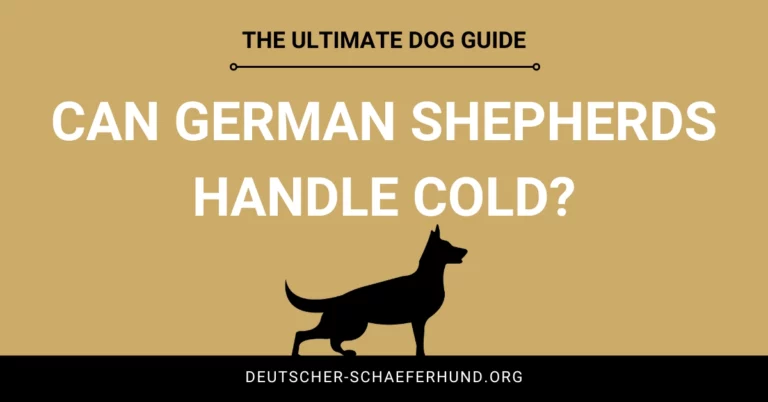German Shepherds are large breed dogs that manage wonderfully in cold weather. Their thick and dense double coat makes them stay warm from within, even when it is freezing cold outside.
And because they originated from Germany, where the temperature during winter drops to 0 degrees Celsius; shepherds are naturally built to handle and survive cold.
Here’s everything you may need to know about German Shepherds and their ability to survive in snowy weather. In this article, we will cover how German Shepherds can survive in cold weather. Can they tolerate too much cold and how you can keep them warm when it’s cold outside? We will also share some tips to warm your GSD in this guide.
 Written By Sergey Uhanov – Certified Veterinarian.
Written By Sergey Uhanov – Certified Veterinarian.
Sergey Uhanov is a certified veterinarian for dogs over 10 years, breeding 3 dogs. He loves dogs and has his own pet clinic in Israel. He likes to help other people with their dogs by sharing his experience and knowledge.
What temperatures can German Shepherds tolerate?
German Shepherds are an adaptable breed that can tolerate different weather types.
With little care and look after from humans, they can easily do well regardless of whatever temperature it is. However, there’s one little downside.
German Shepherds are very focused dogs and no matter how hot or cold they are feeling, they won’t come and indicate that to you.
Instead, it is your duty to figure when it is too hot or too cold for them.
Can German Shepherds survive snow?
German Shepherds can naturally adapt to chilly weather. Since the beginning, they have been working in the freezing temperature of Germany, which made their clan adapt the same.
During winters, German Shepherds can easily withstand temperatures as low as 4 degrees Celsius.
They may likely perform fine even with the temperature dropping down to 2 degrees Celcius.
German Shepherds in snow are supremely active playing, running, and bouncing around. Once they get outside, they may likely even eat some snow.
How cold is too cold for a German Shepherd?
Once the temperature drops below 4 to 2 degrees Celsius, it is too cold for a German Shepherd to handle.
They may function well outside for a while; however, they may likely suffer from hypothermia and frostbite with extended expose.
Do German Shepherds get cold outside?
German Shepherds are naturally built to survive in cold weather and snow. They are one of the finest dog breeds to have especially if you stay in colder regions.
However, that doesn’t mean you can leave them outside for an extended period. During day hours when it is sunny, letting German Shepherds play outside is safe and sound.
However, once the day starts settling, letting them out for a longer duration can prove harmful. No matter how happy or safe your dog seem it isn’t advisable to let them out in snow 24/7.
Once in every while, it is mandatory to get them inside, regenerate their body heat and rejuvenate for the next session.
What naturally prepares your Shepherd for cold weather?
Wondering what makes German Shepherds handle the cold weather?
Here are the instinctual behaviors and characteristics that help them keep warm and survive cold.
Thick and Dense double coat
German Shepherd’s coat has a double layer of fur, which fortunately is their primary defense against cold. The outer coat is dense, harsh, and sleek and works for protection from weather and wind.
However, the inner fur layer is soft and lush that ensuring dry insulation.
Regardless of the weather, it works for keeping their skin dry and untouched from moisture. Unless it is raining heavily, it is difficult that water will reach their skin.
Surface area to volume ratio
As per both science and nature, huge animals have a smaller surface area to volume ratio. This, as result, grants them better heat retention ability.
Highly active nature
German Shepherds are highly active, and this nature helps them keep warm from inside.
Also, because they love snow, they will likely run around playing with it. This, on the other hand, will maintain heat and warmness inside their body.
Muscles
German Shepherds have muscle under their fur, which generates heat through metabolism.
Though it alone isn’t enough to keep them warm during cold, it works as a supporting element.
Other attributes that keep German Shepherds warm during cold temperatures.
- Their paws have a counter-current heat exchanger similar to penguin’s feet.
- It is basically a network of blood inside paws that keep heat managed internally.
- When it is freezing outside, a German Shepherd’s hair and undercoat traps the cold air and keep it from touching the skin surface.
How to keep the German Shepherd warm when it is cold outside?
Even if your dog is having a great time in snow, there are some things you can still ensure for their safety. Keeping German Shepherds warm in winters isn’t difficult.
While half of the things are already managed by their body naturally, here are a few things their owners can contribute as well.
- While taking your German Shepherd outside for a walk during winter, make them wear a jacket. Despite how enough their coat is, a jacket is a must when the temperature is below 8 degrees Celsius.
- Do not hesitate to make your Shepherd wear dog shoes. Despite how enough their paws are, longer exposure in snow can show adverse effects.
- If your dog usually stays in a shelter outside, consider bringing him indoors during winters.
- Prepare a thick and warm bed.
- Throughout winters, feed only warm food to your dog. For drinking, you can slightly heat the water so that the instant chill goes away.
- If it snows for longer in your region, do expose your dog to Winter sunlight. No matter how warm you keep them artificially, some natural heat is a must.
- Avoid bathing your Shepherd as long as you can during winters.
- Avoid letting your dog sleep under or near any open door and windows.
Cold weather tips for German Shepherd owners
- During winters, avoid early morning and late evening walks with your Shepherd.
- Keep a check on your German Shepherd’s temperature. If your Shepherd isn’t panting while running or involved in any physical activity, chances are their body is cold from inside. If you notice so, take them inside or to a warmer space quickly.
- While Shepherds can tolerate snow, windchill is something that may make them miserable. Thus, keep them safe from windchills and cold breeze at any cost.
- Ice and snow can make the dog lose its owners’ scent. Thus, whenever you are out with them, keep them on lease or follow them closely.
- Increase protein in their diet. A protein-rich diet will fill them with energy which will further keep them warm. If your dog isn’t allergic to meat, increase his meat intake during winters.
- Before you let your dog in after a long snow play session, make sure you dry them first. If required, you can use a hairdryer for the same.
- Both puppies and old-aged dogs must be kept inside during winters, especially when it is snowing. Unlike adults, the ones in tender age (puppyhood or old age) may likely find it difficult to survive harsh winters.
Wrapping up
With the right kind of care here and there, let your German Shepherd has his time in the snow.
However, because every dog’s cold tolerance level may differ, always be mindful.
Provide them with basic food, water, and shelter, and make sure you top it with some warmth.
For Further Reading
- Are German Shepherds hard to train?
- Do German Shepherds Need a Lot of Attention?
- Can German shepherds be left alone?



